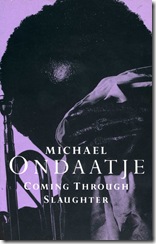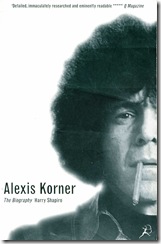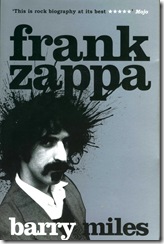Books arrive at The Generalist HQ from all quarters and sometimes they arrive in groups. Hence a quarter of music books, all of which are worth investigating.
The Buddy Bolden Band. Buddy is second from left in the back row. Source: www.mikeballantyne.ca
‘Coming Through Slaughter’ by Michael Ondaatje, most famously known as the author of ‘The English Patient’ is a stand-out experimental fiction (a first novel, first published in 1979) which imaginatively extrapolates from the scraps of knowledge known about the life of Buddy Bolden – a legendary cornet-playing pioneer of jazz. Ondaatje’s prose tries to mimic Bolden’s playing and the patchwork of different texts gives the whole work a musical feel. No recordings of Bolden exist and few photographs. This book has an incredible raw intensity to it matching Bolden’s raw life; he suffered from schizophrenia, was put in a mental hospital after an episode of ‘acute alcohol psychosis and died one year later in 1931 and at the age of 54. It stands in my mind alongside Geoff Dyer’s ‘But Beautiful’ as one of the greatest imaginative books on jazz.
in the book we meet the real life photographer E.J. Bellocq, a strange distorted figure who haunted the brothels of New Orleans, almost a parallel figure to Toulouse Lautrec. He may have photographed Bolden. Bellocq destroyed most of his work and the only surviving glass slides were uncovered and rescued by Lee Frielander in the 1960s. See: iconic photos
*

Source: www.serdanoite.blogspot.co.uk
Alexis Korner was without doubt one of they key figures in the evolution of British music in the ‘50s and ‘60s as I now understand after reading Harry Shapiro’s thorough and absorbing biography.
His background was a mix of cultures and languages, his youth troubled, his appearance never less than striking, his voice distinctive. Along with Chris Barber and the short-lived pugnacious Cyril Davis, he certainly introduced blues to Britain through his clubs in Ealing and Soho. He was also a pioneer of rhythm and blues and his band Blues incorporated was a training ground and showcase for some of the great musicians of his time – including Jack Bruce, Ginger Baker, Phil Seamen, Zoot Money, Dick Heckstall-Smith, Long John Baldry et al.
[Keef acknowledges his importance on p88 of ’Life’. Mick Jagger, Charlie Watts and Ian Stewart had all played with Alexis and he also became great friends with Brian Jones.]
Alexis played with a bewildering number of line-ups, often assembled on the same day as the gig, and extended his musical repertoire to include jazz, gospel and many other forms. He may not have been good at managing money but virtually no-one has a bad word to say about him. He had a natural talent for bringing people together and bringing out the best in them. His London flat where he lived with his wife and partner Bobbie and kids was Number One crash pad and social meeting place for a galaxy of great musicians from Charlie Mingus to Bob Dylan.
Source: www.bluesstammtisch.de/memorie.php
Alexis had a huge career also in broadcasting, hosting numerous radio and tv series on the music he loved. Later he toured restlessly all over Europe, triggering a blues boom on both sides of the Iron Curtain. Yet he never fully achieved either the celebrity or the financial rewards he deserved. This book celebrates a very special man, who died too young (at 55 on Jan 1st 1984). He deserves greater recognition. [There are lots of CDs available, videos on You Tube, online discographies and further info. Get surfing]
[I once had breakfast at the same hotel table with Alexis Korner, in Amsterdam at the first international Legalise Cannabis Conference, which I was covering for the NME and I also had the privilege of sharing a coach from London to Brighton and back with Captain Beefheart and he Magic Band in the early 70s.]
Source: louderthanwar
The Captain Beefheart bio is a stonker. Mike Barnes is not only intensely meticulous but his prose has a real zing in its step which brings Beefheart’s ‘out there’ music to life. A frenzied mixture of deep blues, rock, old Weird Americana and free jazz, exemplified and crystallised in the acknowledged masterpiece of Beefheart’s ouevre ‘Trout Mask Replica’, Barnes relishes in its fury, complexity and intricate word play. He writes;
‘On the opening song, 'Frownland', the new universe of Trout Mask Replica is glimpsed in a one-and-a-half-minute microcosm. For the listener, at least, the tortuous rehearsals, hardship and deprivation had all been worth it. The standard role of the two guitars, bass and drums rock line-up is subverted to the point where nothing ever settles or is repeated to any extent. Stuttering drums vie for space with an angular bass and atonal guitar motif in a different metre, and soon a keening lead guitar line rips its way out of the tangled undergrowth. Less than fifteen seconds in, it dissolves into a torrent, the instruments thrashing around each other in complex contrapuntal patterns. But the music carries an inexorable forward motion - it rocks, in other words. The last piece in the puzzle is Van Vliet's vocal roar. He bellows out a yearning, soulful blues which further warps the already warped structure, pleading, 'I want my own land', realizing that his wish is becoming fulfilled as he sings the words.’
Barnes’ book provides a valuable key to understanding Beefheart the man and his often seemingly impenetrable music. As you will imagine, Don van Vliet’s life was a strange one. As a precocious child, he locked himself in his bedroom for three weeks whilst he modelled all the known mammals of the Northern hemisphere. Once hooked into music via his connection with Frank Zappa (they both lived in the same desert town), he proceeded to follow his unique musical path. He drilled his Magic Band obsessively, giving them alternative identities (Zoot Horn Rollo, The Mascara Snake etc) and browbeating them into learning complex musical pieces which he whistled but never wrote down. Kept in a permanent state of penury and hunger, the musicians stuck with his radical methods and produced music that has had a huge influence on a wide range of subsequent musical genres, analagous to the effect William Burrough’s work has had on modern culture.
Source: http://home.gwi.net/~drrknrl/fzappa.html
Barry Miles bio on Zappa makes an idea companion piece. Zappa and Beefheart had the proverbial love/hate relationship for all of their lives yet each stimulated the other to produce landmark recordings.
By Miles’ account, the key event in Zappa’s life was when he was set –up by a cop who, in the guise of a used-car salesman, offered Zappa and his girlfriend to make an ‘exciting’ tape for a party, including ‘oral copulation’. Zappa spoofed the whole thing but when it came time to make the deal, he was busted on suspicion of conspiracy to manufacture pornographic materials and sex perversion – both felonies. Most of his six-month sentence was suspended but he did spend a hellish 10 days cramped together with 44 men in Tank C of the San Bernadino County Jail. Miles writes:
‘By the time he got out, he no longer believed anything the authorities had ever told him. Everything he had been taught at school about the American Way of Life was a lie. He would not be fooled again. He made sure that his pornographic tape was heard by everyone – he remade it time and time again…rubbing it in the face of respectable society, making America see itself as it really was: phoney mendacious, shallow and ugly.’
Zappa was blessed with a musical genius which he used to blend the ideas of the avant-garde composers Edgar Varese and Igor Stravinsky with 50s doo-wop to produce a vast catalogue of music that remains a unique body of work. His seeming lyrical obsession with sex and the underbelly of US society provided an odd counterpoint to the complex musical backgrounds, further pushing the boundaries at a time when busts for obscenity were common.
He doesn’t come across as a likeable characters. He treated his musicians with cold disdain and spend a large part of his life sequestered away in his own recording and film editing studios, living on a diet of hot dogs, coffee and cigarettes. His jail time put him off drug use completely but his sexual obsessions were given free reign. A control freak, he built intricate business empires and held court in ever-expanding homes where anything went.
Miles doggedly follows in detail the complexity of Zappa’s multivarious enterprises and brings to life most vividly the 60s musical scene in Los Angeles, both on Sunset Strip and Laurel Canyon, where a stellar cast of seminal musicians snorted, puffed, partied and played their way to stardom.
‘Coming Through Slaughter’ by Michael Ondaatje [Picador.1984] ; ‘Alexis Korner: The Biography’ by Harry Shapiro [ Bloomsbury 1996]; ‘Captain Beefheart’ by Mike Barnes [Quarto 2000]; ‘Frank Zappa’ by Barry Miles [Atlantic Books. 2004]
SOME PREVIOUS POSTS ON MUSIC BOOKS:
LED ZEPPELIN: TRAMPLED UNDER FOOT




No comments:
Post a Comment